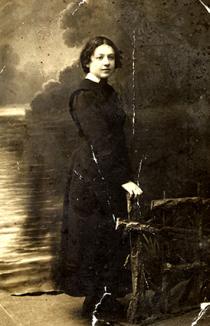Liza Lukinskaya, her mother Feiga Abramson and brother Abram Abramson
This is my mother, Feiga Abramson, my brother Abram and me. The picture was taken in Skaudville, when my brother and I came to visit our parents during holidays in 1940.
I succeeded at school and in 1938 I graduated from the lyceum ranking among the top students. I wanted to become a doctor. In order to enter the Medical Department at Kaunas University I had to take an exam in Latin. We had studied it only for two years and I was afraid that I wouldn’t pass it, so I decided to enter the Biology Department. I could enter it only via an interview and then get transferred to the Medical Department in a year, which wouldn’t be complicated. I settled at the place of my Aunt Fanya, my father’s sister. The first years flew by very quickly.
My brother Abram didn’t do very well at school. Starting from the fourth grade Father transferred him to a Yiddish lyceum where it was easier to study. But Abram had a talent for music. He started playing the accordion, the piano. In 1938 he was drafted into the Lithuanian army and he served in a musical squad in Siauliai.
During that time certain political changes in the country affected our family. Father, a respectable man, who had worked at the brewery for a long time, got a mild hint to leave his post due to an anti-Semitic wave. He wasn’t fired. They let him choose any Lithuanian city where he could be in charge of the stock of the brewery. Thus, my parents left for the small town of Skaudville. Father’s salary barely changed, but he suffered morally from being unjustly laid-off.
In 1939 I submitted my documents for a transfer to the Medical Department. The 1st-year curriculum of our faculties was identical. All I had to do was to go though a physical check. The medical board declared me unqualified for a doctor’s career, though I was healthy, while my Lithuanian friend, who was afflicted with tuberculosis, was enrolled in the Medical Department as per resolution of the same board.
In that period of time Fascist youths appeared in Lithuania and a vexing incident took place at our institute. In a chemistry lecture, those youths demanded from a Lithuanian professor, who was holding lectures for two faculties – Chemistry and Technology, to make Jewish students take separate seats at remote desks. The professor refused and said that all students were equal at his lectures. There was a terrible scandal, the professor had a heart attack and was taken to hospital immediately. Neither he, nor the rector of the institute conceded to the gangsters.
I was a good student, besides I didn’t have to pay practically anything for it. My brother was transferred to another town, not far from Skaudville. We tried to use any chance to visit our parents, be it vacation or holidays. During one of my brother’s leaves, which concurred with my holidays, both of us went to Palanga. It was a wonderful month: warm, care-free and we were sporting on the coast of the warm sea, mixing with people of our age, going dancing and to the cinema.
In June 1940 the Soviet Red Army troops came to the Baltic countries and Lithuania, Latvia and Estonia were annexed to the USSR. Many poor Jews hoped for a better life and they welcomed the Soviet soldiers as liberators with flowers. Other rich Jews and Zionists stood still, awaiting trouble, which soon came. Many of them were exiled to Siberia. My parents took it as a mere fact, but their life changed as well. There was a tank division with the families of the soldiers on the border with Germany, in Skaudville. My mother, a funny and sociable woman soon made friends with those ladies. She played the piano in the army club and militaries often came over to my parents’ place to listen to music and have a good time.




















